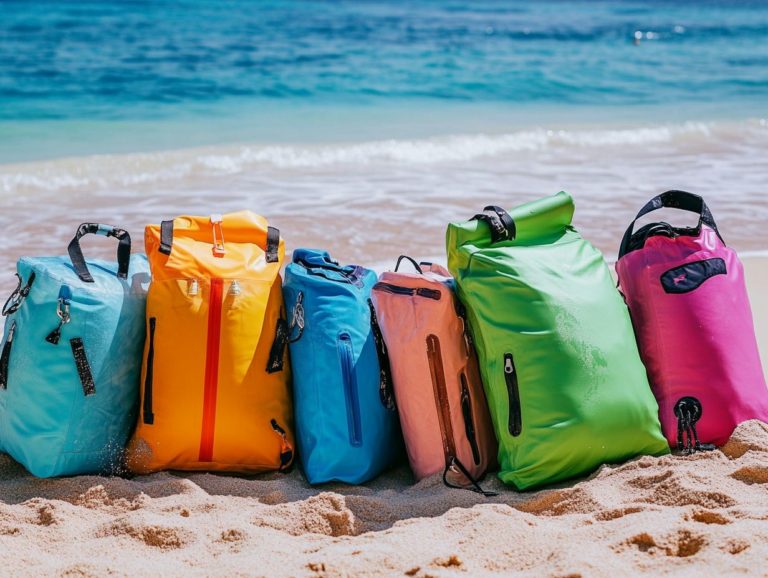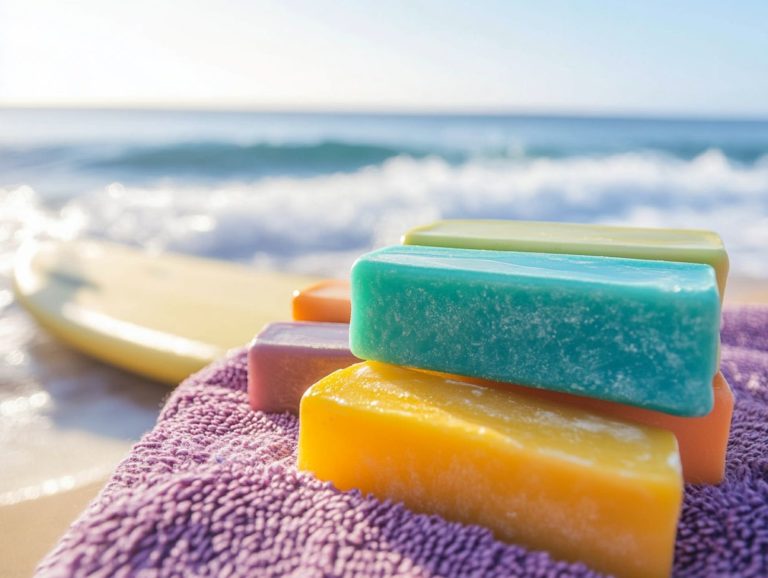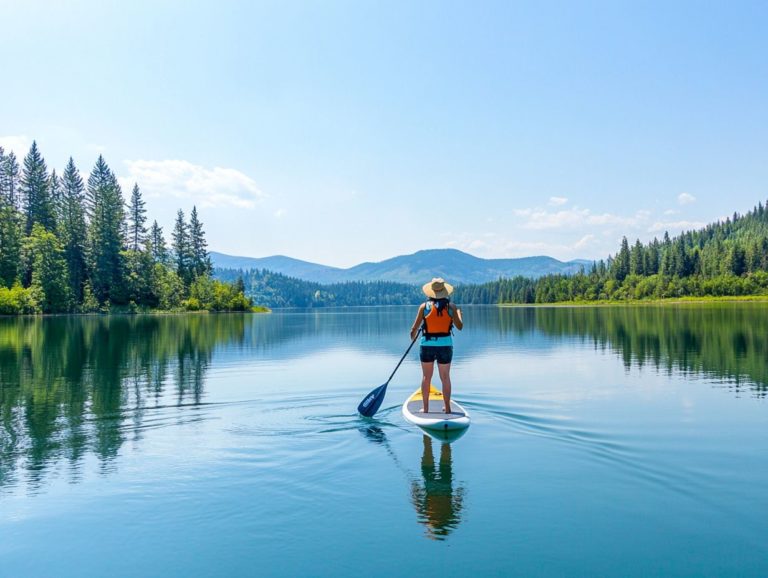5 Tips for Beginner Surfers
Surfing transcends mere sport; it s a lifestyle that forges a profound connection between you and the ocean.
As a beginner yearning to ride those exhilarating waves, this guide is tailored just for you. It covers everything from essential gear that ensures your safety and comfort to fundamental techniques that will help you master your first ride.
You ll also discover insights on selecting the perfect surf spot and strategies to enhance your skills. Grab your gear and get ready to catch those waves! Your surfing adventure awaits!
Contents
Key Takeaways:

- Invest in essential gear like a proper surfboard, wetsuit, and leash for a safe surfing experience.
- Master basic techniques like paddling, standing up, and turning to build a strong foundation.
- Prioritize safety: always check for hazards and respect other surfers in the water.
What is Surfing?
Surfing is an exhilarating water sport that invites you to ride the face of a wave on a surfboard. It connects you with a diverse community of enthusiasts, from eager beginners to seasoned pros. This thrilling activity allows you to experience the ocean’s raw power and stunning beauty while mastering various techniques and equipment suited to your skill level.
Whether you find yourself at iconic surf spots like Malibu and Venice Beach or attending nurturing surf schools and camps, the surfing culture fosters essential skills and camaraderie among fellow surfers. It also promotes a profound respect for the environment.
With roots tracing back thousands of years to ancient Polynesian culture, surfing has evolved into a global phenomenon. It is enriched by a history that intertwines with local traditions and lifestyles. The cultural significance of this sport is strikingly evident as it creates a sense of belonging among participants, transcending geographical boundaries.
Safety is paramount. Wearing appropriate surf equipment and understanding wave conditions is increasingly emphasized, ensuring your well-being and that of your fellow surfers. From the roaring waves of Hawaii to the picturesque beaches of Australia, famous surf destinations unite communities and attract surfers eager to share in this exhilarating experience.
Essential Gear for Beginner Surfers
For beginner surfers, investing in the right surf equipment is essential. This ensures a successful and enjoyable learning experience in the water. Key gear includes a range of surfboards specifically designed for novices, such as foam boards that provide stability and ability to float.
Choosing the right wetsuit keeps you comfortable in different water temperatures. By selecting equipment that suits your individual needs, you can elevate your learning journey and reduce the risks commonly associated with surfing.
Must-Have Equipment
When embarking on your surfing journey, equipping yourself with the right essentials is crucial for both your learning experience and safety in the waves. For beginners, foam boards are highly recommended due to their forgiving nature and enhanced stability. Pair these with the appropriate surfboard fins, and you ll gain better control and maneuverability.
Foam boards, typically larger and thicker than traditional surfboards, offer significant buoyancy. This makes it easier for you to paddle and catch waves, allowing for longer practice sessions without the fatigue that smaller boards often bring.
On the other hand, the right surfboard fins, tailored for various styles and wave conditions, are essential for enhancing stability. They enable you to execute smoother turns and maintain balance. Together, these pieces of equipment not only promote safety by minimizing wipeout risks but also enrich your experience, as each ride becomes an opportunity to build your confidence and refine your skills.
Basic Surfing Techniques
Mastering the fundamentals of surfing is crucial for you as a beginner who aspires to ride waves with confidence and safety. Essential techniques encompass paddling to catch the wave, standing up on the surfboard, and executing turns effectively.
Each of these skills demands practice and a mindful approach to safety. This helps you avoid injuries and ensures a seamless surfing experience. By honing in on these foundational skills, you can significantly elevate your surfing journey and connect more comfortably with the vibrant surf community.
Paddling
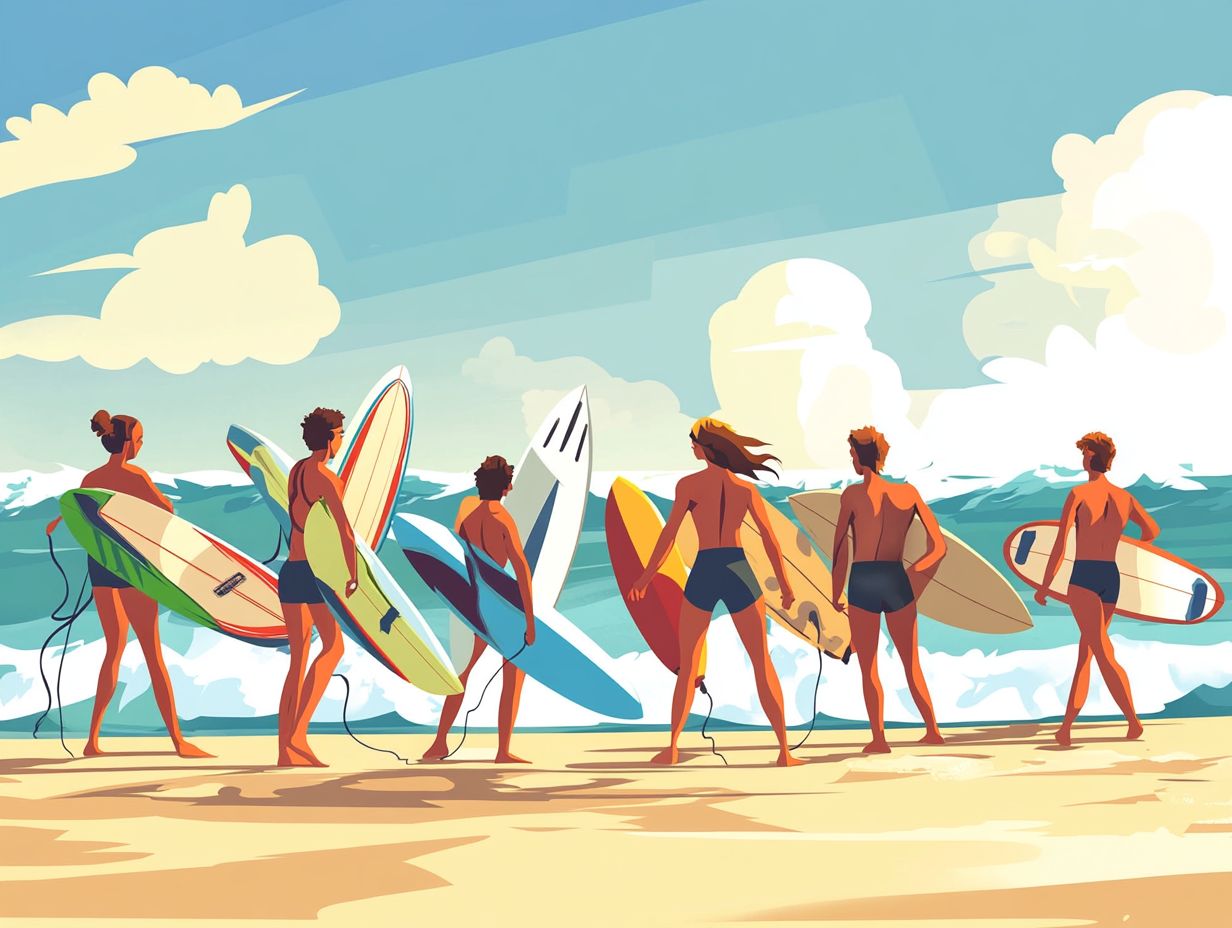
Paddling is an essential skill in surfing that you must master as a beginner to effectively catch waves and navigate the ocean.
This technique involves using your arms to propel yourself forward on the surfboard while maintaining balance and positioning, which significantly impacts your ability to ride waves successfully.
By regularly practicing paddling techniques, you can enhance your overall performance and build confidence in the water.
To refine this skill, focus on your body posture; keep your chest lifted and your hips aligned with the board. A strong and steady glide comes from effective arm strokes, where reaching forward and pulling back in a smooth motion helps you gain momentum.
Positioning yourself just beyond the breaking point of the wave is crucial; this not only improves your chances of catching the wave but also helps you find the best place to catch a wave. Practicing these techniques in varying conditions can greatly boost your adaptability and responsiveness, ultimately leading to more fulfilling surfing experiences.
Standing Up
Standing up on your surfboard is an important skill for beginner surfers and represents a significant milestone in your surfing journey.
This skill requires the perfect blend of timing, balance, and foot positioning as you ride the waves. With consistent practice and following some essential surf learning tips, you can achieve a successful stance and elevate your overall surfing experience.
To master this crucial maneuver, start by practicing your paddling out to the waves while keeping your body streamlined.
When that wave comes your way, timing your take-off is everything; popping up too soon or too late can throw off your balance and stability.
It’s common to overthink the pop-up or feel anxious about the possibility of falling. To tackle these nerves, focusing on your breathing can be incredibly beneficial.
Practicing the pop-up motion on land or using a foam board will sharpen your body memory and bolster your confidence.
Remember to keep your knees slightly bent and your eyes forward to maintain your balance, as this small adjustment can significantly reduce the chances of wipeouts.
Turning
Turning on your surfboard is crucial for navigating waves with style! This fundamental technique enables you, as a beginner surfer, to control your riding experience.
This skill requires you to shift your weight and employ body movements to steer the surfboard in the direction you desire, all while maintaining your balance and stability.
Practice these techniques consistently to build confidence and improve performance. By mastering these turning techniques, you ll not only enhance your surfing abilities but also cultivate a more dynamic connection with the waves.
To execute a turn, start by adopting the correct stance, keeping your balance point low.
When it s time to initiate the turn, it s crucial to shift your weight toward your heels or toes, depending on which way you want to go. You can further refine your maneuver by emphasizing upper body movement; twisting your torso will help guide the board smoothly.
With consistent practice of these techniques, you’ll build body memory that will dramatically improve your performance. As you sharpen your turning skills, you ll find it increasingly effortless to adapt to various wave conditions, enhancing your overall surfing competence and enjoyment.
Staying Safe in the Water
Staying safe in the water is absolutely essential for you as a beginner surfer, ensuring that your learning to surf experience is enjoyable while minimizing the risks that come with the sport.
Key safety tips include understanding local surf spots and sticking to surfing rules. Always be mindful of ocean conditions to avoid accidents.
By prioritizing safety while surfing, you can cultivate a positive relationship with both the ocean and the surf community, significantly enhancing your overall learning journey. For those looking to keep their equipment in top shape, consider these 5 tips for maintaining your surfboard.
Important Safety Tips
For beginner surfers, embracing essential safety tips can significantly elevate your experience in the water while minimizing risks. Being aware of local surfers and their etiquette, understanding wave conditions, and knowing how to handle a wipeout (when you fall off your board) are crucial for ensuring a safe surfing adventure.
By weaving these safety measures into your practice, you can cultivate confidence and a deep respect for the ocean.
To pinpoint safe surf spots, consult experienced surfers or local surf schools; their insights into the best locations based on your skill level and current conditions are invaluable. Observe how locals interact, respect their space, and wait your turn, especially in crowded areas.
Staying alert and aware of your surroundings is essential. Understanding rip currents and identifying your entry and exit points can significantly reduce risks. Practicing these safety tips not only keeps you secure but also contributes to a vibrant and positive surfing community.
Choosing the Right Surf Spot
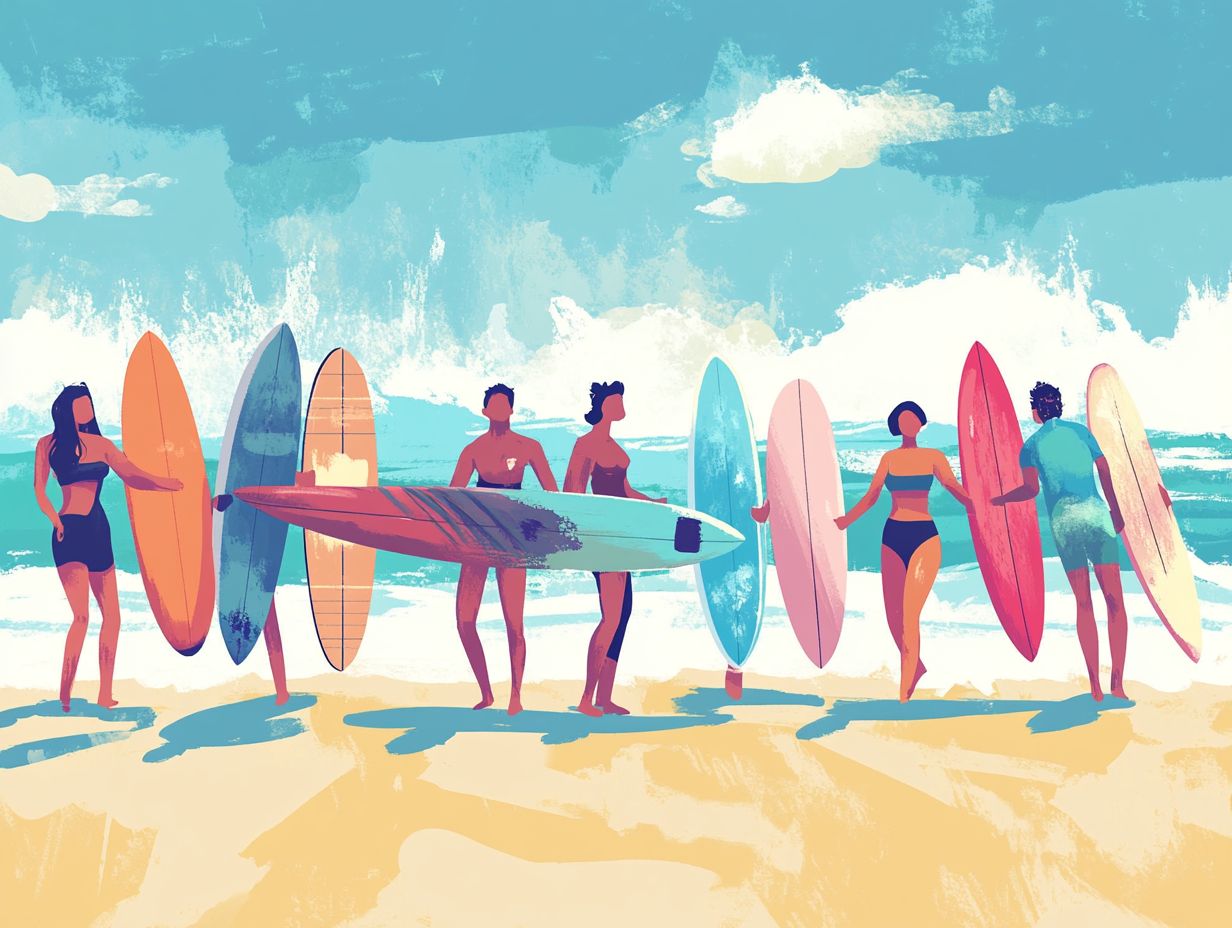
Selecting the ideal surf spot is a pivotal decision for beginner surfers. This choice significantly shapes their learning experience and safety. Consider the shape of the waves, the necessary skill level, and the crowd size. Also, be aware of the preferences of local surfers who know the conditions intimately.
By making informed choices about where to surf, novices can enhance their chances for both improvement and enjoyment, setting the stage for a rewarding journey on the waves.
Factors to Consider
- Wave size and type
- Local surf conditions
- Presence of hazards
- Skill level of fellow surfers
When selecting a surf spot, beginner surfers should take into account these key factors that will greatly influence their experience on the water. By being mindful of these elements, you can make informed decisions that align with your abilities, ensuring a safer and more enjoyable surfing adventure.
Pay attention to wind conditions; strong winds can alter wave behavior and make rides more challenging. It’s also crucial to evaluate the tide, as some beaches are more favorable during high or low tides.
Understanding local etiquette, including the right of way and respecting more experienced surfers, fosters a positive atmosphere in the water. Check for safety hazards like rocks, rip currents, and marine life for a worry-free experience.
By considering these factors, your journey of learning to surf can be both enjoyable and secure.
Improving Your Surfing Skills
Getting better at surfing is exciting and fun! It requires dedication and the strategic application of effective progression tips. As a beginner, elevate your abilities by practicing essential techniques, seeking advice from seasoned surfers, and immersing yourself in surf schools or camps designed for skill enhancement.
By concentrating on structured improvement, you will enhance your surfing experience and forge deeper connections within the vibrant surf community.
Tips for Progression
To truly excel in surfing, focus on a few key tips that can elevate your performance in the water:
- Prioritize consistent practice.
- Seek feedback from seasoned local surfers.
- Attend surf schools to refine your techniques and boost your confidence.
By embracing these tips for progression, you can steadily enhance your surfing abilities and fully enjoy your time in the ocean.
Establishing a regular practice routine is essential! Spending time in the water a few times a week can lead to remarkable improvements. For those interested in enhancing their skills, checking out the top 10 tips for effective stand-up paddleboarding can be beneficial. Joining local surf clubs offers invaluable opportunities to connect with experienced surfers who can provide tailored mentorship and advice suited to your skill level.
Even participating as a spectator in local surf contests can spark motivation and foster a sense of community, allowing you to gain insights and learn from more advanced riders.
Embracing these avenues sharpens your technical skills and deepens your passion for the sport, creating lasting connections with fellow enthusiasts.
Frequently Asked Questions
What are the top 5 tips for beginner surfers?
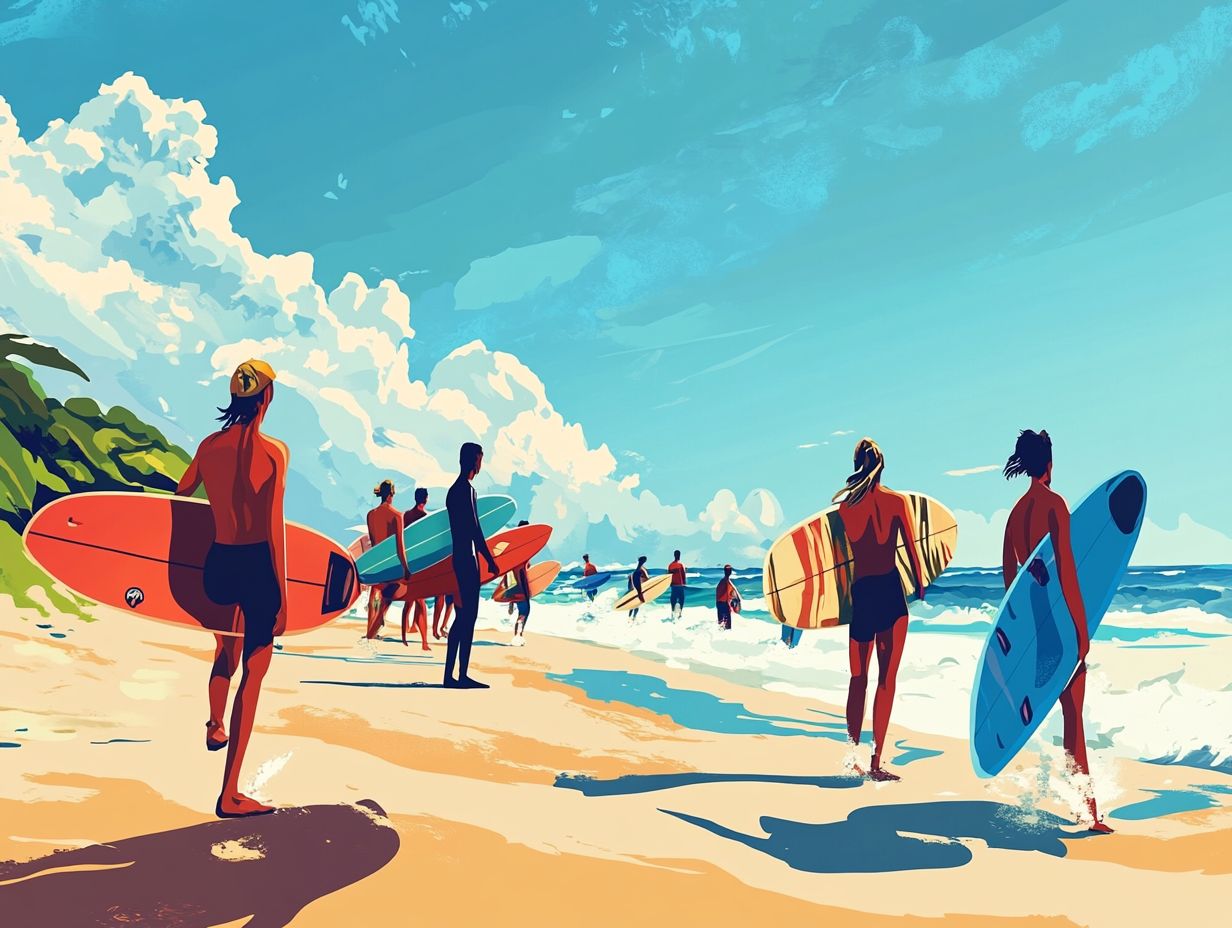
1. Choose the right board. Start with a larger, stable board like a longboard. This helps you balance and catch waves easily.
2. Find a good instructor. A knowledgeable instructor can make your learning process a lot smoother.
3. Practice proper paddling technique. This is crucial for catching waves and staying stable.
4. Learn how to read the waves. Understanding ocean movements will help you catch more waves and avoid danger.
5. Don t give up! Surfing is an exciting journey, so keep at it and enjoy every wave!
Should I invest in my own surfboard as a beginner?
You don t need to buy your own surfboard right away. Renting allows you to try different styles before making a decision.
What should I wear while surfing as a beginner?
A wetsuit keeps you warm and protects your skin. Don’t forget a leash to keep your board close and avoid losing it!
How can I improve my balance while surfing?
Practice balance exercises, like standing on a balance board or doing yoga. These can help you stay stable on your board.
Is it important to know the rules of surfing as a beginner?
Yes! Knowing the rules of surfing can create a safer and more enjoyable experience for everyone in the water.
How can I stay safe while surfing as a beginner?
Always surf in designated areas and avoid crowded spots. Listen to lifeguards and pay attention to any warning signs at the beach.


